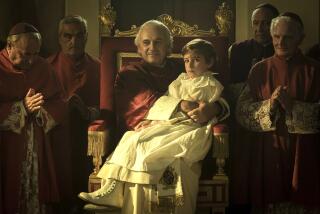A Sober Story of Lost Identity
- Share via
The bleak artistry at work in Aharon Appelfeld’s new novel, “The Conversion,” is fiction-making of a high and powerful order. A very specific, sober and dread-instilling kind of fiction-making to be sure: Appelfeld, who is regularly (and not wholly accurately) described as an heir to Franz Kafka, seems particularly attuned to the master’s legacy in this book, whose atmosphere of disorientation, bureaucratic bloodlessness and inexorably grinding fate to some degree invokes “The Trial.” Appelfeld’s agenda is more circumscribed than Kafka’s, however, and far more patently religious as he follows the consequences of a conversion from Judaism to Catholicism of one Karl Huber, a bureaucrat in his 30s who lives in Austria at some time in the early decades of this century.
We are never told when Karl lives. Although we are told where, identifying details are purposefully spare so that he might as well be Any Jew living in Any Town, Europe, in the period before the Holocaust. After the Holocaust, young men like Karl and his friends Martin, a lawyer, and Hochhut, a businessman, would never so casually abandon their heritage merely because it helps advance their careers.
Although one of Karl’s friends tells him that the conversion ceremony is “no more than a tonsillectomy,” soon afterward Karl feels as if his legs are “weighed down.” His legs, like his conscience and his heart: While Karl may respond, fleetingly, to the church’s physical splendor, there is never any real question that by turning his back on his heritage, Karl’s future will be anything but grim and pained. The issue is only how grim, to what degree pained and what enlightenment, if any, will come to Karl along the way.
*
In brief, unadorned chapters, Appelfeld juxtaposes pieces of Karl’s past and present lives. The only child of struggling shopkeepers, Karl was a strong student at the gymnasium, but his parents did not have enough money to send him to university. Now orphaned, Karl lives alone in the family home, where he feels that “life was gradually evaporating.” His days are given to work and to seeing his friends in taverns or in the whorehouse they frequented in their youth.
In time, even this chilly, tenuous routine erodes Karl’s friend Martin, who drinks heavily and is found dead. Hochhut falls into debt, regrets forcing his parents to convert and becomes insane. As Karl’s mind drifts over the past, he recalls the instances of anti-Semitism he has faced: from his teachers at the gymnasium, from drinkers at the tavern, from colleagues at work. He may no longer identify himself as a Jew, but in moments of tension, the identity is readily imposed on him. So it has always been.
Slowly, like sunlight burning through clouds, Karl’s origins break out in him. A movement to tear down the city’s shabby old Jewish neighborhoods gains momentum, and Karl objects. His Aunt Franzi dies, and he is moved by her funeral. In the tavern, he gets into a fight defending the Jews. Most poignantly, his lonely life is transformed by the return of his family’s housekeeper, Gloria, who--it emerges--had absorbed his parents’ lives fully while he was “merely a drifter in their world.” Though not Jewish, Gloria keeps milk and meat separate, puts out apples and honey on Rosh Hashana and fasts on Yom Kippur. Gloria, who possesses “a religious sensibility that recognizes that not everything can be seen,” has in fact undergone a subtle mirror conversion to Karl’s. They become lovers and are briefly happy.
Briefly. As Karl’s passion to preserve the old neighborhood grows, he is attacked as a defender of the Jews. He is pilloried for his unconventional relationship with Gloria, and the couple is eventually hounded out of town. They move to the village in which his mother was born and spend an idyllic interlude before anti-Semitism rises up like a miasma out of this lushly beautiful countryside. The story ends in inevitable darkness but not without first conveying the essence of a man who grasps, and suffers, the pivotal and profoundly deracinating effects of having so casually renounced his roots.
More to Read
Sign up for our Book Club newsletter
Get the latest news, events and more from the Los Angeles Times Book Club, and help us get L.A. reading and talking.
You may occasionally receive promotional content from the Los Angeles Times.








